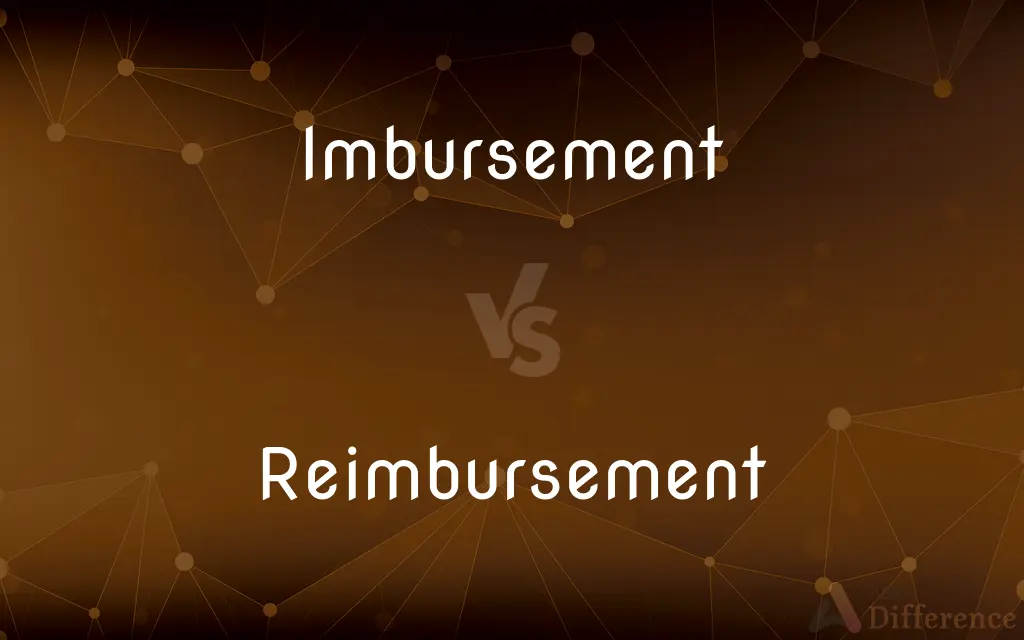Imbursement vs. Reimbursement — What's the Difference?
Edited by Tayyaba Rehman — By Fiza Rafique — Updated on April 5, 2024
Imbursement involves making payments, while reimbursement is about repaying for expenses incurred.

Difference Between Imbursement and Reimbursement
Table of Contents
ADVERTISEMENT
Key Differences
Imbursement refers to the act of paying out money, typically as a way to fulfill a requirement or settle a debt. This term is often used in formal financial and legal contexts. It involves the initial disbursement of funds for various purposes, ranging from operational expenses to investment activities. Whereas reimbursement is specifically about paying back money that someone has spent on behalf of another person or entity. This process usually involves submitting evidence of the expenditure, such as receipts or invoices, to the payer for verification before the funds are returned.
In the context of business operations, imbursement might be seen when a company allocates funds for project development, paying upfront for resources, services, or goods. This action is proactive, aiming to cover expected or agreed-upon costs. On the other hand, reimbursement occurs after the expenses have been incurred, often by employees or partners who initially paid out of their own pockets expecting to be paid back. This is a reactive financial activity, compensating for costs already paid.
Imbursement can also relate to the provision of funds for specific purposes, such as grants or subsidies, without the expectation of direct repayment. These funds are provided to support activities or projects that align with the payer’s objectives or requirements. Reimbursement, in contrast, is based on a premise of restitution; it's about restoring funds to someone who has made expenditures on another's behalf, ensuring they are not financially disadvantaged by their actions.
From a documentation perspective, imbursement may require less rigorous proof of expenditure at the moment of payment, as the focus is on providing funds rather than verifying their use. Documents like contracts or payment schedules might be more relevant in these cases. Reimbursement processes, however, typically require detailed documentation of expenses to ensure accuracy and legitimacy of the claim before repayment is made.
Imbursement and reimbursement, while both involving the transfer of money, cater to different financial scenarios. The former is more about the allocation of funds for anticipated needs or obligations, whereas the latter addresses compensation for expenses already incurred. These mechanisms work together in many organizational financial systems to manage cash flow and financial responsibilities effectively.
ADVERTISEMENT
Comparison Chart
Definition
Payment made for a specific purpose or to settle a debt
Repaying someone for expenses they have incurred
Purpose
To fulfill a requirement or investment
To compensate for expenses already made
Documentation
May require contracts, payment schedules
Requires receipts, invoices for proof of expenditure
Timing
Occurs before expenses
Occurs after expenses have been incurred
Financial Flow
Involves disbursing funds
Involves repaying or refunding funds
Compare with Definitions
Imbursement
Payment made to fulfill a financial obligation.
The company's imbursement for the new building was processed yesterday.
Reimbursement
Necessitates documentation for expense verification.
Their policy states that no reimbursement will be processed without adequate receipts.
Imbursement
Often associated with initial financial outlays.
The imbursement for the project's resources was scheduled for the first quarter.
Reimbursement
Commonly used for business-related expenses paid by employees.
After submitting his receipts, he was quickly given reimbursement.
Imbursement
Involves funding for investments or grants.
The government's imbursement in renewable energy projects is increasing yearly.
Reimbursement
Repayment for expenses incurred on behalf of another.
She received a reimbursement for her travel expenses last week.
Imbursement
Refers to fulfilling a monetary requirement.
Legal imbursement was made to settle the outstanding debts.
Reimbursement
Payment occurs after the expenses have already been made.
The reimbursement for the project supplies arrived after the event.
Imbursement
Covers operational or project costs upfront.
Imbursement for the marketing campaign was approved by the finance department.
Reimbursement
Acts as a form of financial restitution.
The reimbursement covered all the conference expenses he had paid out-of-pocket.
Imbursement
(obsolete) The act of imbursing, or the state of being imbursed.
Reimbursement
Reimbursement is the act of compensating someone for an out-of-pocket expense by giving them an amount of money equal to what was spent.Companies, governments and nonprofit organizations may compensate their employees or officers for necessary and reasonable expenses; under US law, these expenses may be deducted from taxes by the organization and treated as untaxed income for the recipient provided that accountability conditions are met. UK law provides for deductions for travel and subsistence.
Imbursement
(obsolete) Money laid up in stock.
Reimbursement
To repay (money spent); refund.
Imbursement
The act of imbursing, or the state of being imbursed.
Reimbursement
To pay back or compensate (another party) for money spent or losses incurred.
Imbursement
Money laid up in stock.
Reimbursement
The act of compensating someone for an expense.
Reimbursement
The act reimbursing.
Reimbursement
Compensation paid (to someone) for damages or losses or money already spent etc.;
He received reimbursement for his travel expenses
Common Curiosities
What is imbursement?
Imbursement is the act of paying out money, usually to fulfill a financial obligation or invest in a project.
How does reimbursement work?
Reimbursement involves repaying someone for expenses they have incurred, often requiring proof of expenditure.
How are imbursement and reimbursement different in timing?
Imbursement usually happens before expenses are incurred, while reimbursement occurs after the fact.
Can a reimbursement be denied?
Yes, if the expenses are not properly documented or do not comply with policy, reimbursement can be denied.
What role does imbursement play in business operations?
It's crucial for covering operational costs and fulfilling financial obligations.
Can volunteer expenses be reimbursed?
Yes, volunteers can be reimbursed for out-of-pocket expenses related to their volunteer work.
Can an employee receive imbursement?
Employees typically receive reimbursements for out-of-pocket expenses rather than imbursements.
Can imbursement be for any type of payment?
Yes, imbursement can be for any type of payment made for a specific purpose or to settle a debt.
Is documentation always required for reimbursement?
Yes, documentation such as receipts or invoices is typically required to verify and process a reimbursement.
Do grants fall under imbursement or reimbursement?
Grants are considered imbursements as they provide funds for specific purposes without expectation of repayment.
What types of expenses can be reimbursed?
Expenses that can be reimbursed include travel, supplies, and other business-related costs.
How do companies handle reimbursement for remote employees?
Companies typically use expense reports and digital submissions to process reimbursements for remote employees.
Is imbursement taxable?
It depends on the context and purpose of the payment; consult a tax professional for specific cases.
Does imbursement require approval?
Yes, imbursements usually require approval from authorized personnel or departments.
What is the main difference between imbursement and reimbursement?
The main difference is that imbursement is about making payments for a purpose, while reimbursement is about paying back expenses incurred.
Share Your Discovery

Previous Comparison
Sincere vs. Sincerely
Next Comparison
Helicase vs. TopoisomeraseAuthor Spotlight
Written by
Fiza RafiqueFiza Rafique is a skilled content writer at AskDifference.com, where she meticulously refines and enhances written pieces. Drawing from her vast editorial expertise, Fiza ensures clarity, accuracy, and precision in every article. Passionate about language, she continually seeks to elevate the quality of content for readers worldwide.
Edited by
Tayyaba RehmanTayyaba Rehman is a distinguished writer, currently serving as a primary contributor to askdifference.com. As a researcher in semantics and etymology, Tayyaba's passion for the complexity of languages and their distinctions has found a perfect home on the platform. Tayyaba delves into the intricacies of language, distinguishing between commonly confused words and phrases, thereby providing clarity for readers worldwide.















































